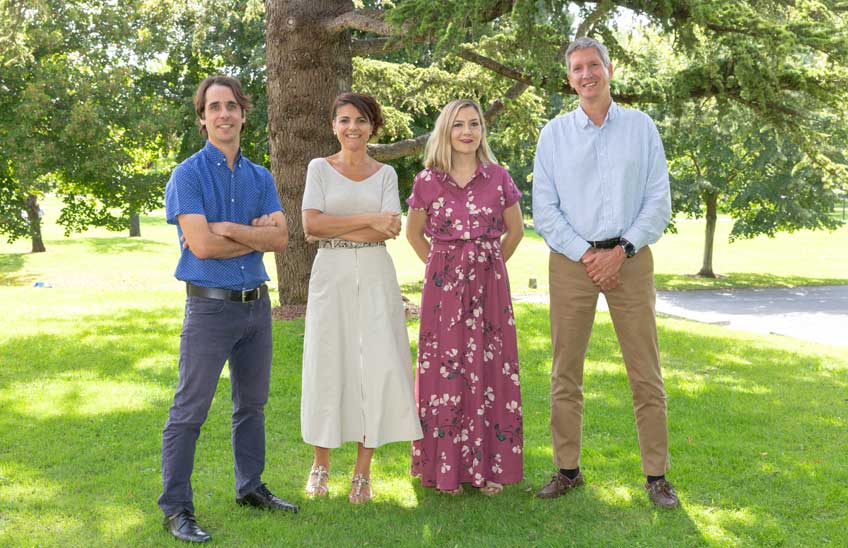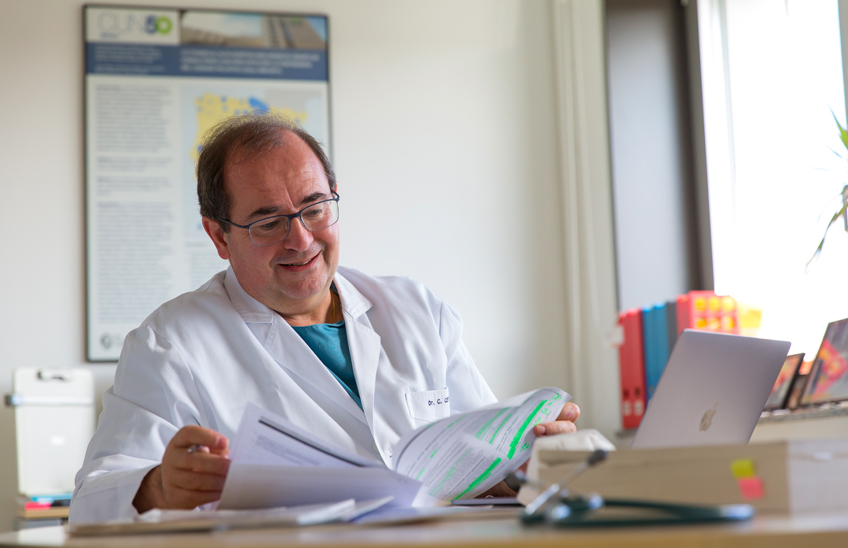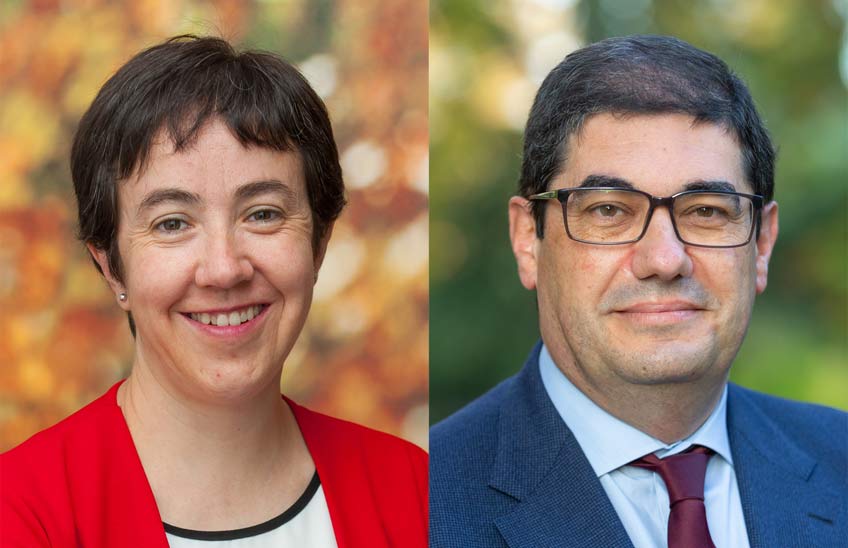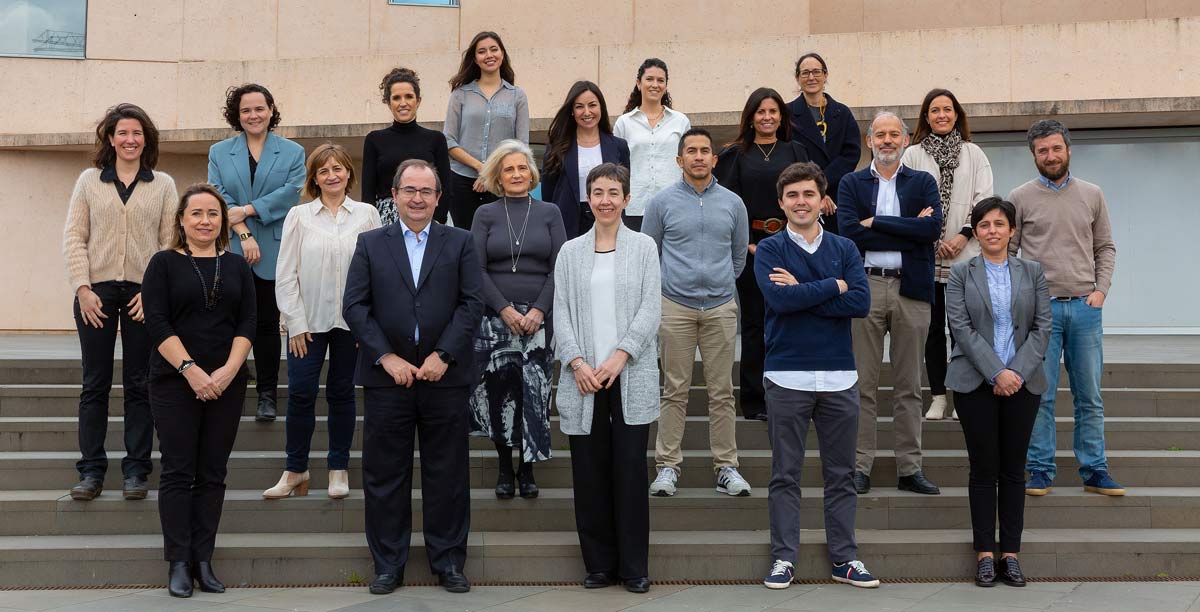Half of the world's population will need palliative care for severe and end-of-life conditions by 2060
The World Health Organisation sponsors an international symposium organised by the Ramón Areces Foundation and the University's ATLANTES Global Palliative Care Observatory.
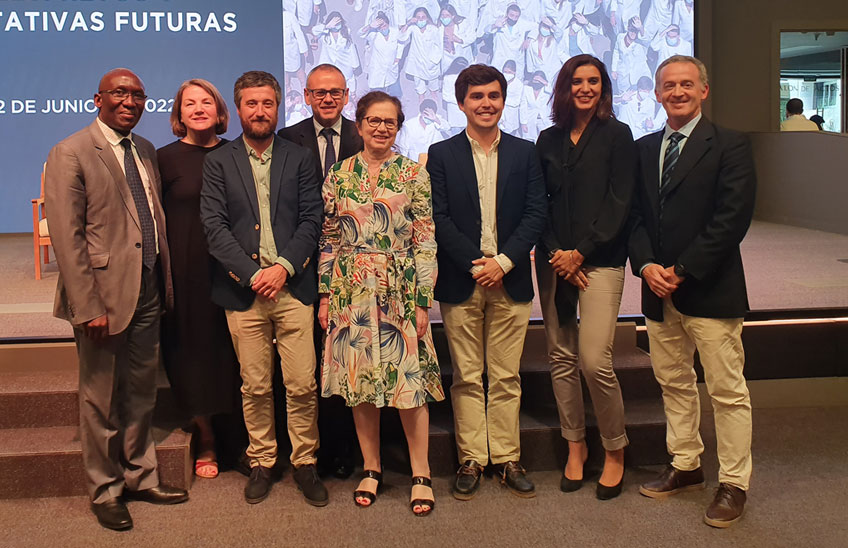
FotoIsabel Solana<br>/De izquierda a derecha: Emmanuel Luyirika, Julie Ling, Eduardo Garralda, Joaquim Julià Torras, Marie-Charlotte Bouësseau, Álvaro Montero, Nasim Pourghazian y Matías Najún.
23 | 06 | 2022
The issue number of people in need of palliative care will almost double by 2060: from 26 million to 48 million worldwide. Because of the subject of diseases that occur, up to half of all people will need palliative care relief for severe and end-of-life conditions. This was stated during the international symposium 'Global Palliative Care: Challenges and Expectations', held at the Ramón Areces Foundation.
The symposium, sponsored by the World Health Organization (WHO), was promoted by the Foundation and the Global Palliative Care Observatory ATLANTES of the University of Navarra (ICS), which has been designated as the new WHO Center for of the Global Palliative Care. Institute for Culture and Society (ICS) of the University of Navarra, which has been designated as the new WHO Center partner for the assessment of the development Global Palliative Care.
Pandemic and war in Ukraine
agreement According to the estimates of academic community, the proportion of adults currently in need of palliative care for cancer is relatively high for all regions, and especially in Europe (41.3%) and the Americas (40.8%). In Africa, AIDS predominates (77%), while in Asia (40%), the Eastern Mediterranean (19%) and, to a lesser extent Europe (15%), cerebrovascular diseases also account for this demand. Dementia is also particularly important in the latter region (18%).
Panellists from international organisations such as the WHO, the African Palliative Careassociation and the International Palliative Careassociation , as well as the M.D. Anderson Cancer Center (USA) and Hospice Buen Samaritano (Argentina) participated in the symposium.
From agreement with Julie Ling, executive director of association European Palliative Care and palliative care consultant at WHO (European Region), the old continent has been a pioneer of the modern hospice movement since the 1960s. "The mapping that has been carried out since 2007 shows how much progress has been made in terms of the scope and development of palliative care," she said.
In his view, one of the main catalysts for this momentum, especially in low- and middle-income countries, has been the 2014 World Health Assembly resolution (67.19) on strengthening palliative care. "The WHO European Regional Office comprises 53 countries and is engaged with all of them, although it has focused on several countries in the eastern part, where the need has been identified the most," he added.
With regard to the current moment, he commented that recent political, socio-economic and financial situations, especially the pandemic and the humanitarian crisis resulting from the war in Ukraine, "have had major implications for development and the provision of palliative care across the region".
Nasim Pourghazian, from the WHO's department prevention and management of non-communicable diseases (Eastern Mediterranean Region), referred to the status of this specialization program in the Eastern Mediterranean region. In his opinion, it has been substantially improved by the establishment of a network of experts from this and other geographical areas: "It has been an enriching forum for exchange of experiences and materialisation of ideas. It has allowed us to maintain a regional perspective that respects the different realities of our countries, while making the most of our strengths.
For Pourghazian, there is a need to raise awareness of palliative care among policy makers, healthcare providers and the general public: "We need to help them understand what palliative care is, why it is important, and how it can improve patients' lives and benefit our health systems. In this effort to communicate these messages, he said it was essential to "engage local leaders who know both topic and the realities of the nations".
research training and sophisticated clinical practices
Katherine Pettus, Director of Advocacy and Partnerships at association International Association for Palliative Care (IAHPC), said that over the past twenty years, palliative care professionals discipline "have built a new canon of knowledge, ethics and internship". He explained that palliative care programmes operating on a small scale around the world are generally funded by charity and only a few are publicly funded.
Pettus said that advocates of these initiatives aim to "adapt this global public good to all national and local codes and cultures". To this end, he said they are "willing to share with all health systems their current plans, carefully developed under the standards and oversight of various UN agencies, and always at partnership with civil society".
In this regard, he stressed the need to promote specialization program in all parts of the world and that the solutions that materialise "should be indigenous, sustainable and culturally acceptable". He also stressed the importance of involving patients, families, health professionals and health economists to act as ambassadors to philanthropists, legislators and opinion leaders, so that they can contribute to its implementation.
The introduction of palliative care in academia was the focus of Eduardo Bruera's speech, director of department of Palliative Care and Rehabilitation Medicine at the University of Texas, M.D. Anderson Cancer Center (USA). The progress of medicine and health sciences," he emphasised, "depends on the active participation of universities and tertiary hospitals, as they are where the most sophisticated clinical practices are taught, researched and developed".
Dr Bruera insisted on the importance of presenting to the deans of Schools, hospital directors, medical associations and health managers "the value of supportive and palliative care for patients, families, professionals and their own institutions".
From their perspective, one of the great challenges is precisely "to make them understand that the human suffering associated with illness is complex and that they need to create the Structures to improve the clinic, teaching and research".
Caring for people without resources
Lastly, Matías Najún, head of the Comprehensive (Palliative) Care Service at Austral University Hospital and co-founder and current president of Hospice Buen Samaritano (Argentina), spoke. He shared the experience of this care centre to illustrate the care of people without resources. "Research shows that poverty reduces access to palliative care, which in turn is a very scarce commodity worldwide," he acknowledged.
"In our health systems, which are designed for the acute or speciality-centred, palliative patients are avoided, but if they are also poor, they become almost invisible," he lamented. In these cases, in which "the complexity of life is much greater than the disease", he called for "being creative in order to make them visible, providing care that is accessible and tailored to these patients", because "beyond the social reality, when someone suffers, great poverty is not only an economic issue; the lack of care that dignifies at that moment is also a concern", he concluded.
The line of research of Palliative Medicine of the University of Navarra is one of the main axes of its Strategy 2025. It promotes a social impact-oriented research and a scientific production focused, in this case, on the search for personalized solutions for the health care of patients with diseases that involve severe pain.

